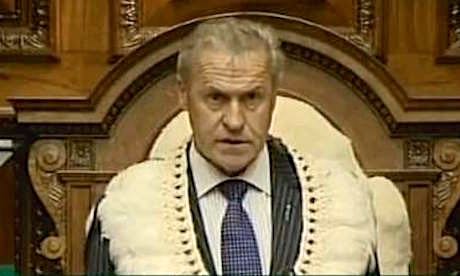New Life Churches International is urging Christians to oppose any changes in the parliamentary prayer.
Rasik Ranchord, spokesperson on public issues for New Life Churches International, has sent out an email asking church leaders to get their members to write to members of parliament urging them to retain the present prayer.
On 17 November the Speaker, David Carter, sent a letter to all members of Parliament regarding two options for the prayer that is read at the commencement of each day’s parliamentary business.
MPs have been told the choice is between the existing prayer, which is 70 words long, and the 82 word proposed alternative.
No amendments will be allowed.
He has asked for their feedback by Friday 5 December 2014.
The second version is in Maori and English.
Ranchord says the English section in this version “is a ‘cut and paste’ version of the present prayer”.
He says the following segments have been omitted:
- and of our country to the glory of Thy name
- the maintenance of true religion
- through Jesus Christ our Lord
Contentiousness surrounding the parliamentary prayer is not new.
The present parliamentary prayer was adopted in 1962 and it was last reviewed in 2007.
At the first sitting of the NZ House of Representatives on 26 May 1854 religious differences between Protestant and Catholic were deftly handled by Speaker Clifford (Catholic himself) in bringing the local Anglican clergyman in to do the honours.
Those who drafted the New Zealand constitution were emphatic that it should guarantee strict equality for all.
A South Island Scot, James Macandrew, moved that the first act of the House of Representatives should be a public acknowledgment of the divine being and a supplication for his favour on its future labours.
Seconded by a Scot from Nelson, this was at once challenged by a Roman Catholic from Auckland, who protested against converting the House into a conventicle.
An Aucklander said that he too felt deeply grateful to providence for having brought him to New Zealand, but as members were of various denominations, he would not care to see a clergyman of any particular sect brought in to say prayer.
James Edward Fitzgerald, the supreme constitutionalist, held that the very appearance of a state religion should be avoided.
With that in view, when the Canterbury Provincial Council was about to meet, the Church of England members attended service in their own parish church.
At this stage, Mr Weld, who later became Sir Frederick Weld, Premier, begged that nothing should be done to impair the perfect religious equality of members.
Mr Weld was an English born Roman Catholic. His amendment affirming the principle of religious equality was lost by 20 to 10
Macandrew’s motion was carried. Prayers were read by the Reverend F.J. Lloyd, Church of England, who it was said to be the first clergyman to be found.
The House then saw no harm in giving the assurance Weld had asked.
Later it was agreed that the Speaker would say the prayer
Source
